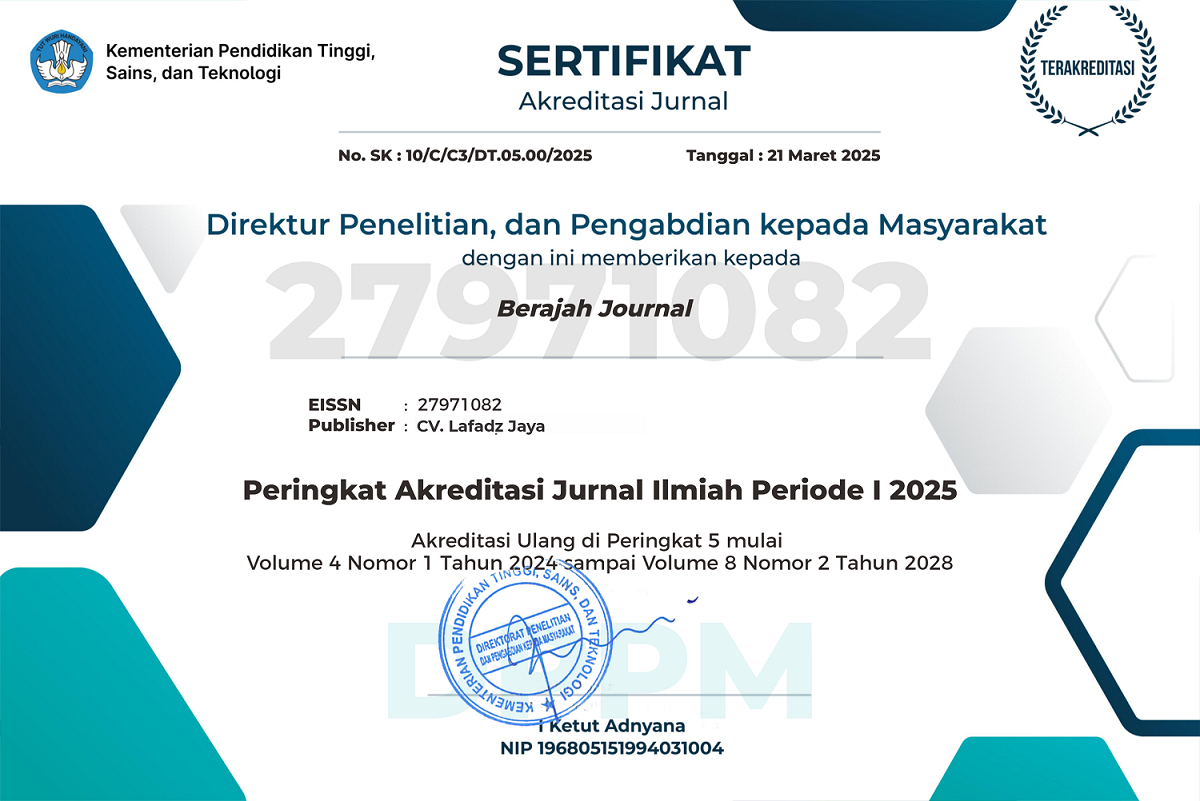PENGARUH PENGALAMAN TRAUMATIS BERUPA PERILAKU ABUSIVE ORANGTUA KEPADA ANAK TERHADAP PSYCHOLOGICAL WELL-BEING
DOI:
https://doi.org/10.47353/bj.v2i2.92Keywords:
pengalaman traumatis, perilaku abusive orangtua, psychological well-beingAbstract
Penelitian ini bertujuan untuk mengetahui pengaruh pengalaman abuse dari orangtua kepada anak terhadap psychological well-being anak-anak itu saat dewasa kelak. Penelitian ini menggunakan pendekatan penelitian kuantitatif dengan metode data survei yang disebarkan secara online dengan total 318 partisipan dengan rentang usia 18-29 tahun. Alat ukur yang digunakan dalam penelitian ini merupakan alat ukur yang sudah di terjemahkan dan di uji validitasnya, yaitu Childhood Trauma Questionnaire yang memiliki koefisien reliabilitas Cronbach alpha per tiap dimensinya sebesar 0,74 untuk emotional abuse, 0,83 physical abuse, 0,88 sexual abuse, 0,80 emotional neglect, dan 0,58 untuk sexual abuse. Sedangkan alat ukur Psychological Well-Being memiliki koefisien reliabilitas Cronbach alpha sebesar 0,912. Hasil analisis data menunjukkan bahwa terdapat hubungan negatif dengan signifikansi yang lemah antara pengalaman traumatis perilaku abusive orangtua kepada anak dengan psychological well-being anak di masa dewasa awalnya (p=0,064; R2=0,011). Lalu berdasarkan hasil analisis data juga terdapat besaran pengaruhnya, pengalaman traumatis perilaku abusive orangtua kepada anak dapat memprediksi sebesar 1,1% terhadap psychological well-being anak pada di usia masa dewasa awalnya.
Downloads
References
Armsworth, M. W., & Holaday, M. (1993). The effects of psychological trauma on children and adolescents. 72(1), 49–56. https://doi.org/10.1002/j.1556-6676.1993.tb02276.x
Arnett, J. J. (2015). Emerging adulthood: A theory of development from the late teens through the twenties (2 ed.). Oxford University Press.
Bewick, B., Koutsopoulou, G., Miles, J., Slaa, E., & Barkham, M. (2010). Changes in undergraduate students’ psychological well‐being as they progress through university. Studies in Higher Education, 35(6), 633–645. https://doi.org/10.1080/03075070903216643
Bottoms, B. L., Nielsen, M., Murray, R., & Filipas, H. (2004). Religion-related child physical abuse: Characteristics and psychological outcomes. 8(1–2), 87–114. https://doi.org/10.1300/J146v08n01_04
Bowman, N. A. (2010). The development of psychological well-being among first-year college students. 51(2), 180–200. https://psycnet.apa.org/doi/10.1353/csd.0.0118
Chen, M., & Chan, K. L. (2016). Parental absence, child victimization, and psychological well-being in rural China. 59, 45–54. https://doi.org/10.1016/j.chiabu.2016.07.009
Dale, L. P., Carroll, L. E., Galen, G., Hayes, J. A., Webb, K. W., & Porges, S. W. (2009). Abuse history is related to autonomic regulation to mild exercise and psychosocial wellbeing. 34(4), 299. https://doi.org/10.1007/s10484-009-9111-4
Gelles, R. J. (1980). Violence in the family: A review of research in the seventies. 42(4), 873–885. https://doi.org/10.2307/351830
Grossi, E., Blessi, G. T., Sacco, P. L., & Buscema, M. (2012). The interaction between culture, health and psychological well-being: Data mining from the Italian culture and well-being project. 13(1), 129–148. https://doi.org/10.1007/s10902-011-9254-x
Herrenkohl, T. I., Klika, J. B., Herrenkohl, R. C., Russo, M. J., & Dee, T. (2012). A prospective investigation of the relationship between child maltreatment and indicators of adult psychological well-being. 27(5), 764–776. https://doi.org/10.1891/0886-6708.27.5.764
Huppert, F. A. (2009). Psychological Well-being: Evidence Regarding its Causes and Consequences. 1(2), 137–164. https://doi.org/10.1111/j.1758-0854.2009.01008.x
Kendall-Tackett, K. (2002). The health effects of childhood abuse: Four pathways by which abuse can influence health. 26(6–7), 715–729. https://doi.org/10.1016/S0145-2134(02)00343-5
Kurniasari, A. (2016). Kekerasan versus disiplin dalam pengasuhan anak. 1(2). https://doi.org/10.33007/inf.v1i2.143
Levinson, D. J., & Levinson, J. D. (1997). The Seasons of a Woman’s Life. Ballantine Books. https://books.google.co.id/books?id=De6mCSp2PzkC
Love, K. M., & Murdock, T. B. (2004). Attachment to Parents and Psyhcological Well-Being: An Examination of Young Adult College Students in Intact Families and Stepfamilies. 18(4), 600–608. https://doi.org/10.1037/0893-3200.18.4.600
Matud, M. P., López-Curbelo, M., & Fortes, D. (2019). Gender and Psychological Well-Being. International Journal of Environmental Research and Public Health, 16(19). https://doi.org/10.3390/ijerph16193531
Maynard, M. J., & Harding, S. (2010). Ethnic differences in psychological well-being in adolescence in the context of time spent in family activities. Social Psychiatry and Psychiatric Epidemiology, 45(1), 115–123. https://doi.org/10.1007/s00127-009-0047-z
Neuman, W. L. (2007). Basic of Social Research: Qualitative and Quantitative Approaches (2 ed.). Pearson Education.
Pratama, H. (2016). Well-being dalam Sudut Pandang Budaya: Sebuah Kajian Literatur.
Rachmayani, D., & Ramdhani, N. (2014). Adaptasi bahasa dan budaya skala psychological well-being. 253–268.
Ramadhan, A. (2022, Januari 20). Laporan Kasus Kekerasan terhadap Anak dan Perempuan Meningkat 3 Tahun Terakhir. Kompas.com. https://nasional.kompas.com/read/2022/01/20/12435801/laporan-kasus-kekerasan-terhadap-anak-dan-perempuan-meningkat-3-tahun
Ryff, C. D. (1989). Happiness is everything, or is it? Explorations on the meaning of psychological well-being. 57(6), 1069–1081.
Santrock, John. W. (2011). Life Span Development, Perkembangan Masa Hidup Edisi Ketigabelas jilid I (Terjemahan: Benedictine Widyasinta). Erlangga.
Shek, D. T. (2005). Paternal and maternal influences on the psychological well-being, substance abuse, and delinquency of Chinese adolescents experiencing economic disadvantage. 61(3), 219–234. https://doi.org/10.1002/jclp.20057
Sneddon, H. (2003). The effects of maltreatment on children’s health and well-being. 9(3), 236–249. https://doi.org/10.1080/1357527032000167795
Sugaya, L., Hasin, D. S., Olfson, M., Lin, K. H., Grant, B. F., & Blanco, C. (2012). Child physical abuse and adult mental health: A national study. 25(4), 384–392. https://doi.org/10.1002/jts.21719
Sugiyono. (2017). Metode Penelitian Kuantitatif, Kualitatif, dan R&D. Alfabeta.
Tarber, D. N., Cohn, T. J., Casazza, S., Hastings, S. L., & Steele, J. (2016). The Role of Self-compassion in Psychological Well-being for Male Survivors of Childhood Maltreatment. Mindfulness, 7(5), 1193–1202. https://doi.org/10.1007/s12671-016-0562-4
Videon, T. M. (2005). Parent-child relations and children’s psychological well-being: Do dads matter? 26(1), 55–78. https://doi.org/10.1177/0192513X04270262
Winefield, H. R., Gill, T. K., Taylor, A. W., & Pilkington, R. M. (2012). Psychological well-being and psychological distress: Is it necessary to measure both? Psychology of Well-Being: Theory, Research and Practice, 2(1), 3. https://doi.org/10.1186/2211-1522-2-3
Downloads
Published
How to Cite
Issue
Section
License
Copyright (c) 2022 Avisca Shaliza Fahmi, Afif Kurniawan

This work is licensed under a Creative Commons Attribution 4.0 International License.






















